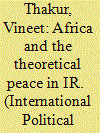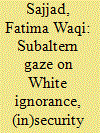| Srl | Item |
| 1 |
ID:
141298


|
|
|
|
|
| Summary/Abstract |
This article responds to the debate on “The End of IR Theory?” that appeared in a recent volume of the European Journal of International Relations. It argues that the pronouncements about “theoretical peace” carry the subtext of “epistemic violence,” foreclosing the debate and the possibility of theoretic interventions emerging from the non-West—in this case, Africa. Elucidating how IR theory (IRT) has remained a parochial enterprise by the deliberate silencing of Africa, the article then finds pathways by which Africa can contribute to IRT. Using the metaphor of storytelling, it lists eight different ways in which Africa can tell new stories in IR.
|
|
|
|
|
|
|
|
|
|
|
|
|
|
|
|
| 2 |
ID:
192989


|
|
|
|
|
| Summary/Abstract |
In this article, I, as a subaltern, offer a reverse gaze on White security plans to rescue the world from the tide of violent extremism. Violent extremism has been identified as a global security threat by the United Nations, which announced a Plan of Action to combat the threat in 2016. Education has been considered a valuable tool for preventing violent extremism. In 2017, UNESCO published a policy guide explaining how education can be used to prevent violent extremism. This article offers a critique of the UNESCO policy guide, using the construct of White ignorance as explained by Charles Mills and Jennifer Mueller’s Theory of Racial Ignorance. This critique, coming from a location (Pakistan) where education has been under intense White scrutiny since 9/11, owing to its alleged link with violent ideologies, provides an inverse perspective on the problem of violent extremism. Using Mills’s concept of the epistemology of ignorance, I argue that international security policies view security as maintenance of White hegemony and refuse to listen to the people labelled as a security problem by White epistemic authorities. I contend that it is the White security policy that needs to be educated to prevent violence and maintain durable security.
|
|
|
|
|
|
|
|
|
|
|
|
|
|
|
|